Reading Nicholas Capaldi’s biography of John Stuart Mill put me in mind of Mill’s ‘Autobiography’ and I found I had it on Audible already, so the rest was easy, well not quite. See below for some comments on using the Audible app.
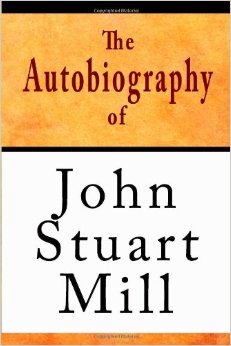
Although his voice was a clarion for social equality and personal responsibility, generations of students have since been taught to despise John Stuart Mill as a progenitor of evil liberalism.
Sounds odd I know, but since the 1960s jaded intellectuals have made careers biting the hand – liberalism – that feeds them, having insufficient imagination to do anything creative themselves. When these pygmies are long gone, John Stuart Mill’s books will still be read; that will be the judgement of history. It is little wonder that the feeding hand has gradually lost enthusiasm for subsidising intellectuals.
Mill started to write the ‘Autobiography’ when he had a nervous breakdown early in life and then went back to it later. In addition, Harriet Taylor had a hand in editing it. Many PhDs have been earned trying to figure out when Mill wrote portions of it, and what Taylor took out or put in. The Audible version I listened spared me this Pin-HeadeD detail.
The early chapters are a description of the childhood of this prodigy with an emphasis on his father’s method of educating him. It is exhausting to listen to the account, the more so knowing, as he must surely have himself known in retrospect, that most of it was meaningless. Prodigious, yes, but neither lasting or meaningful. He may have read in Greek Plato’s ‘Apology’ at five years of age, but he did not understand it. So, too, with much else in this force-fed education, which was all work and no play everyday for years on end.
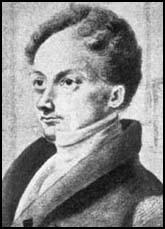 James Mill
James Mill
One unintended consequence of this gruelling education was that Mill was THE hyper-nerd. He grew up in a hot house that he seldom left until he was a late teenager when he went out of the house to go to work at the East India Company where he toiled for his father.
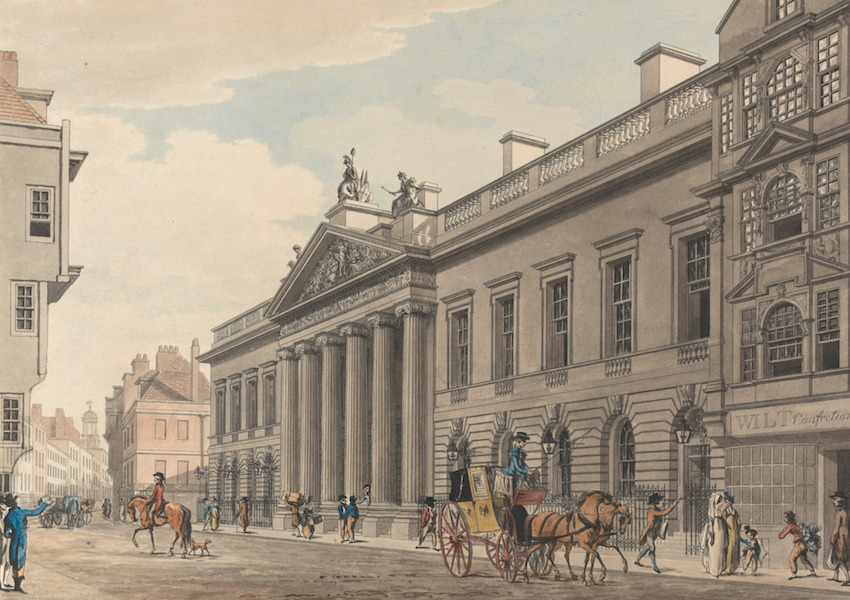 East India House
East India House
He was in his father’s shadow for much of his life everyday, socially, intellectually, and morally. It is painfully apparent to an auditor of the ‘Autobiography’ that Mill had no friends. He had peers; he had colleagues; he had associates; he had debaters and opponents. But he had no friends, which he as much as says more than once, though he uses the term ‘friend,’ it usually means someone he knew, and nothing more intimate. He had no interests but the unforgiving logical analysis of important matters learned from and constantly reinforced by his father. This is not the person to sit next to at dinner. He could debate the great issues of the day but he could not make small talk, or show any interest in pictures of a seat-mate’s children. A cold fish, I would guess. Ready to beat you to death in argument and inept in passing the butter, because he never played any boyhood games meant he had zero physical dexterity, something he himself notes twice in the ‘Autobiography.’
Chapter Five (5) is superb. In it Mill reflects on his many and varied experiences, and knocks off some bon mots as only he could. He paraphrases Thomas Hobbes’s remark that ‘When reason is against a man, he retaliates by being against reason’ which made me think of all those deniers (climate change, Catholic Church pedophilia, Holocaust, Greek debt, etc.). I listened to this while walking the dog, pushing pedals at the gym, or taking the train, so I could not take notes or mark-up the text.
HIs conclusion in this chapter is that political theory is best confined to a few principles which would allow inferences to be drawn in particular circumstances, rather than trying to lay down a single ideal institutions. Mill lost faith in a singularly unified theory and recognised the inescapable influence of context. Under the influence of Alexis de Tocqueville, Mill wanted the deductions to be based on facts, hence I referred above to inferences and not deductions.
Likewise, Mill concluded that perfect political institutions were of no value in themselves. The underlying social order was decisive. The most perfect political institutions would be hollow shells unless the society valued and embraced them for their purposes. To make a comparison, the church may be full, but do they really believe and act like Christians everyday in every way?
Mill once fancied himself ‘a reformer of the world,’ but during his depression, he asked himself this question: If all the material and moral ideals he espoused were realised in the world, would he then be happy? No, he answered. He concluded that happiness if not an end in itself, but rather a by-product of purposeful activity. Both trip and arrival are important.
In Chapter Six (6) Mill refers to Mr. Warren and the villages he set up. It was a passing reference but I want to see it in the printed text when the copy I ordered arrives. I found a reference to Warren and his villages in a history of anarchism. Mill’s praise for Warren villages is odd, since Mill knew nothing about them, not even if they existed. So much for Tocqueville’s influence.
Later in Chapter Seven (7) he refers to the Hare-Clarke voting system as the salvation of representative government over several pages. I have passed these passages on to Anthony Green. Likewise there is also in this chapter a reference to multiple votes for the educated, rather than the propertied, and I must get that and send it to Glyn Davis who once asked me about my comment, somewhere, on Mill and multiple votes. In the ‘Autobiography’ Mill says he proposed multiple votes in a submission; I have since tracked it down and will pass it on in due course.
There are some odd things about the ‘Autobiography’ to be sure. Mill never mentions his mother though there are many, many references to his father who died when Mill was thirty (30). It would seem his father had those nine (9) children all by himself. James Mill was a formidable fellow but he was no hermaphrodite. While there are only a few early references to Mill’s work for the East India Company. Yet Mill specialists have some strange stories about his habits at work.
This review affords an opportunity to correct some errors I made in the review of Capaldi’s biography. It was not Bentham that introduced Mill to poetry. Several peers led him to poetry. I also said he was called a Mechanical Man, not quite, but rather a Manufactured Man by some who found the analytical engine of his mind artificial and inhuman.
I found this Audible reading to be unsympathetic. It sounded almost mechanical, phrases of equal length and inflection followed one another without regard to the content. Perhaps that is partly a fault of Mill’s writing style, which is replete with dependent, relative, and embedded clauses with asides and comparisons which makes it precise but it does not flow.
Not quite easy I said, because Audible kept dropping out, asking me to log in again, resetting the book mark, and so on. None of that is easy when using the iPhone while dog walking. No doubt I brought this on myself, somehow. But it was annoying, and a lesser man might have quit.
Month: July 2015
‘Noah Webster: The Life and Times of an American Patriot’ (1998) by Harlow Unger
Noah Webster (1758-1843) has shadowed me through life. In reading rooms, office desks, library shelves, legal offices, conference halls, spell-checkers, and seminar rooms, wherever I have gone there I found a direct line back to him on the spine of dictionaries. This Webster is that Webster, the dictionary man.
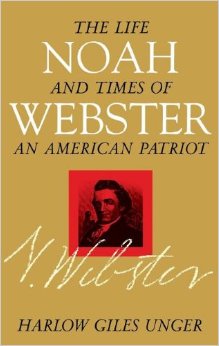
How and why he became that is a story I could no longer deny myself. He grew up in western Connecticut when it was the frontier. He was the bookish middle son. The family decided to see to his education, while the other children stayed and worked the farm. Off he went to a common (public) school where the emphasis was on discipline (secured by rod and whip). Not even the brutality he found there could quench the intellect within and at sixteen he entered the local church school, Yale.
At the time church and state were united in a Tea Party dreamworld. Taxes were paid at the local church which doubled as town hall and government offices. Yale was little more than a Calvinist secondary school for parsons, and it was funded by those taxes paid at churches. There was no religious toleration. Those who were not Congregationalists were, however, free to move west.
The taxes Great Britain imposed on the thirteen American colonies to pay for the expense of defending them in the French and Indian War of 1754-1763 were punitive, and precipitated the Revolutionary War 1775-1783 (in which the colonist reputiated their sovereign debt to England). Webster’s father had been a militiaman in the French war and during the Revolutionary War, Noah Webster joined a student brigade which marched around but found no English redcoats. However, the Revolution fired him with patriotism for the new world in the making.
He took up teaching children to read upon leaving Yale, and apprenticed to a lawyer for a career in law. That changed when in late 1783 his travel to a cousin’s wedding took him through an encampment of the recently victorious Continental Army of the United States. He, youthful idealist, was thrilled to see and meet the men who had created this New Jerusalem.
What he found was Babel. The men were at odds with each other over scarce provisions, ragged clothing, three-years of back-pay eroded discipline, and — what was worse — was the cacophony of languages. He heard Swedish from the men of Delaware, German from Pennsylvania, Dutch from New York, Welsh from Maryland, Irish from Massachusetts men, Scots from others, French from the forest men of Maine, Spanish from a few from the Caribbean, Italian was also to be found. All of these were further divided into dialects. If anything, English was just one of the plurality of languages.
The language barriers within Americans made prospects for productive cooperation unlikely, and it soon became his lifelong ambition to unite the States with an American language. He formed this ambition at twenty years of age, and stuck to it. The result is on the shelf, Merriam-Webster’s Dictionary. (‘Merriam’ because when he died the brothers Merriam, long-time friends, neighbours, and admirers of Noah, bought the copyright from Noah’s widow, as a way of insuring her financial security. Part of that agreement was keep the name ‘Webster’ on it.)
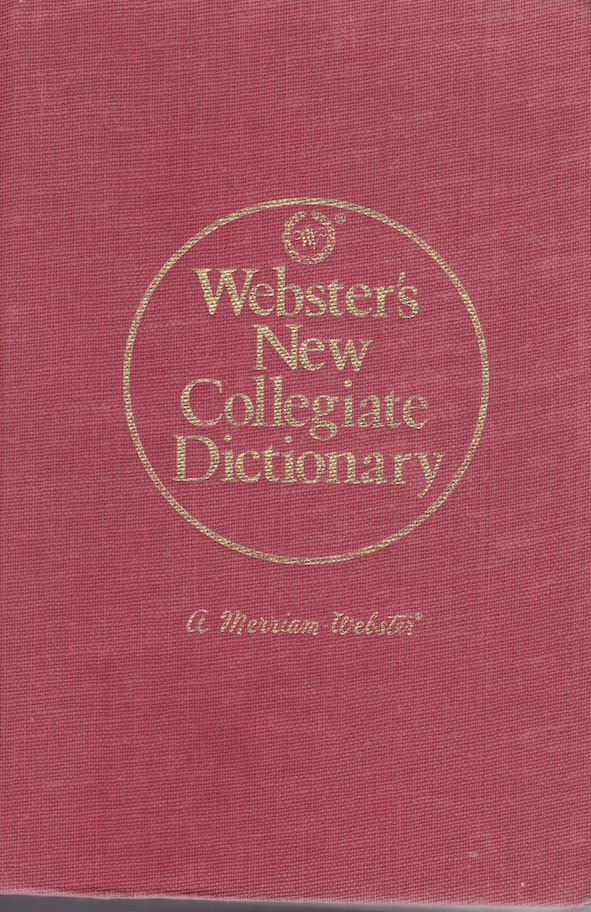 My copy.
My copy.
The division, conflict, unproductive confrontations that he saw in the army camp were mirrored and enlarged among the victorious colonies which were held together by the so-called Articles of Confederation (1776-1789) which had only a congress meeting briefly twice a year. Each state was a law and nation unto itself. Pennsylvania and seven other states had a state army. At the borders of each state tariffs were levied. Since the British had not surveyed more than one hundred miles inland in most places, there were disputes about western borders that were settled by the gun. Each state issued its own coins and bank notes, ran a postal service of sorts. Some levied visa charges for visitors from other states. A murderer could flee across a state border and most likely escape pursuit or apprehension. I said fourteen states, and not thirteen, because Vermont seceded from New Hampshire.
For Webster to secure copyright for his first book meant that fourteen state legislatures had to enact copyright legislation and he then had to secure fourteen separate warrants, each with slightly different conditions. In this state of confusion, there were those who thought returning to British suzerainty would be preferable. Some of these were diehard Tories and others just wanted order and stability.
All of this division stimulated Webster to redouble his efforts. H travelled to nearly every state capitol, selling his book as he went, and lobbied first for a copyright law and then to secure copyright for his book(s). Doing so was hard, expensive, and took him away from home for months at a time. It also made him a national figure, with personal friends in every state.
He was innovator in every respect, As a teacher he thought school was to teach children to read and write, not simply to beat them into submission. He pitched his lessons at the level and world of his five and six year olds, striving to make learning fun, interesting, relevant, and easy. He was very successful at it. He set up his own school and parents who wanted their children, both girls and boys, to learn subscribed to it. He prepared his own teaching material and these became the three books: The Speller, The Grammar, and The Reader. Each was American in each and every way.
To make spelling easy and fun he simplified it, by dropping silent letters, like ‘u’ in most occurrence of ‘ou’ or the unpronounced double ‘l’ in traveller or the double ‘g’ in waggoner, and matching sound to letter by using the ‘z’ extensively. He dropped many, many other silent letters, so that ‘give’ became ‘giv’ and the same for all words with an unsounded terminal ‘e.’ He also tried to change existing spelling to match sound so that some instances of the letter ‘c’ became ‘s’ or ‘sh’ which certainly have made English easier to learn. English, in part because of its polyglot origins, has many silent letters and varieties of letter sound values. And he thought American English had to be learned, and it would be better for being distinct from British English and for being rational in the spirit of the Enlightenment. He was an admiring reader of Jean-Jacques Rousseau, John Locke, Adam Smith, and their ilk.
He likewise inventive in grammar, dropping the Latin cases which had theretofore been used to teach English grammar. Reader, when was the last time the ablative was necessary?
The reader, aimed at young children, was entirely home grown. Gone were incomprehensible British essays about the Astronomer Royal, or legal disquisitions on the Welsh marches, and in came essays about the New England forests, thanksgiving with the native indians, and paeans of praise for the stalwarts of the Revolution. He made an exception for the poetry of William Wordsworth.
No publisher would touch his work. It was too novel, untried, and untested. He borrowed from his family and paid for the first edition of The Speller himself. Five hundred were printed, and by the end of the year 5,000 had been sold. He set the price low to make it accessible and he invested the income in The Grammar, and so it went. Throughout his life he made enough money to live and support his family, but nothing more.
He was a publisher’s dream author. He travelled the country for weeks and months at a time, selling the books in person to every churchmen, legislator, lawyer, judge, and school teacher he could find. During this period he also found time to argue for a stronger national government and that won him friends among the emerging Federalists (and enemies among others). Indeed in the Constitution of 1789 some of his ideas were embodied, and others he proposed were deleted. Chief among those embodied was a strong central executive, the President, and among those rejected were universal manhood suffrage, female equality, and emancipation the slaves.
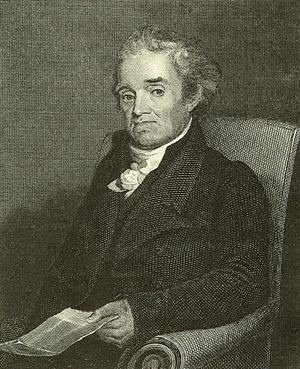 Noah Webster.
Noah Webster.
Much of the middle of the book is a summary of American history in the turbulent period from 1789 to 1830. Reading it reminded me of how well educated I had been, there along the Platte, because I knew most of it in broad: Citizen Genet, the undeclared naval war with France, the Jay Treaty, Thomas Jefferson’s ascendence, and so on. Webster was constantly in the fray, opinionated, pompous, self-righteous, and often right. He saw unity as the only path to survival, and advocated a strong central government.
He moved to New York City to found first a magazine and then a newspaper, both of which failed at personal and professional expense. He then revised his school books and went on the road to sell them. Finally at about 40 he sold the rights to his books, rather than face another round of travel, and started on the dictionary that made him immortal. He also worked with his cousin Daniel Webster (he of the devil in the Ambrose Bierce story) to enact the first copyright legislation in the United States.
He worked on the dictionary singlehanded for 20+ years and compiled 70,000 entries, far in excess of its only rival, Dr Johnson’s (which I am proud to say adorns our shelves). To study the etymology of words Webster learned German, to go with the French and Latin he had. In time he traced words through dozens of languages. He travelled to London and Paris when he was 60 to research in libraries there. It was a Herculean labour. The result was pure Noah Webster. Definitions, examples, the etymology was slanted to reflect his Calvinism, American patriotism, and Anglo-Saxon heritage.
It was difficult to find a way to publish this whopper. He did finally manage to do so with financial support from John Jay (of the Federalist Papers), and it was an immediate commercial and critical success. He had long since modified his efforts to reform spelling on rational grounds and moderate his zeal for being a know-it-all. The two volume work that resulted was hailed far and wide.
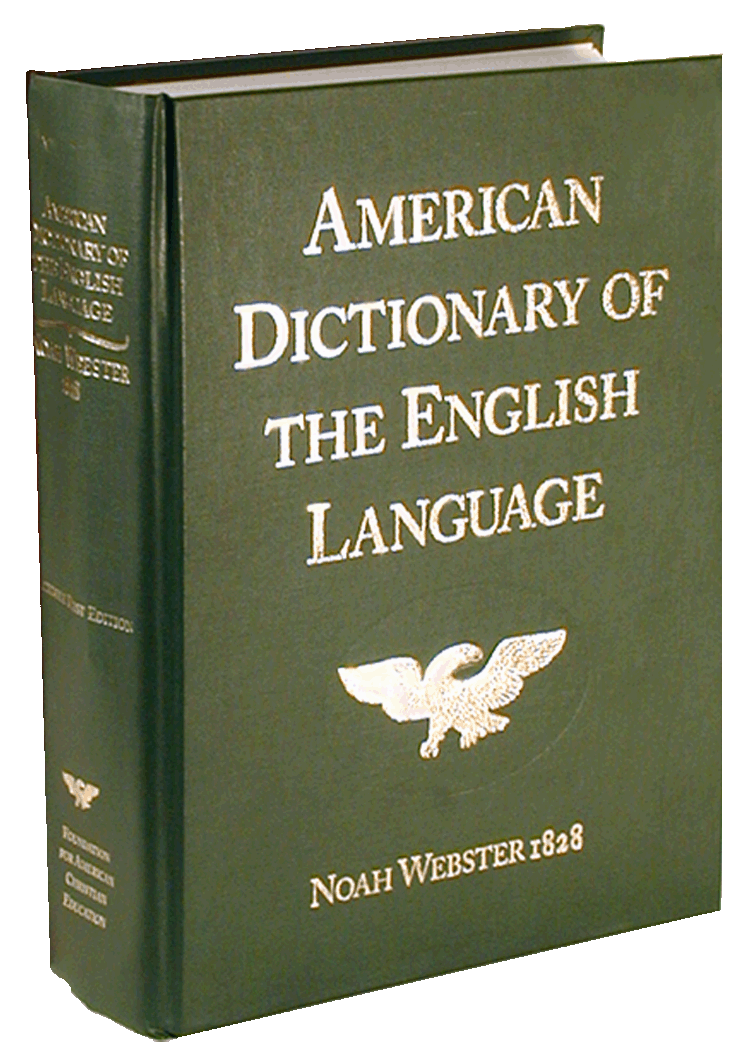
Since the veneration for Dr. Johnson and his dictionary had prevented any new dictionary in England for two generations, Webster’s was taken up there with enthusiasm. For a time more copies of Webster’s Dictionary were sold in England than in the United States, despite the explicit American character of Webster’s from the title page on. In a 1917 court ruling the name Webster on a dictionary passed into the public domain and anyone may now use it. Only Merriam Webster dictionaries trace directly back to Noah.
Nearly all the men who led the Civil War had learned to read and write from Webster, the tireless advocate of unity. Jefferson Davis had once in the Senate explicitly praised Webster and his speller. Only those who were self-educated, like Abraham Lincoln, had escaped Webster’s influence. Even a century and a half later, I grew up in the world of words he created. In high school Webster’s Dictionary was on the shelf. In college, purchasing a copy of Webster’s Collegiate was required. In graduate school Webster’s Enlarged was necessary to write that dissertation. When I started teaching I acquired the current edition. Regrettably I cannot trace the genealogy of the spellchecker to be sure but I hope it goes back to the brothers Merriam and from them to Noah.
Remarkable, energetic, and a polymath, Webster was many things. He was also arrogant, a know-it-all, a man who loved the sound of his own voice, a micro-manager, someone who did not understand the word ‘no’ when applied to him. He must have been a very high-maintenance individual. He also ha[ed the Constitution, fathered the copyright laws, founded Amherst College, taught a nation to spell, and brought forth that dictionary (and its many imitators that use his name) that remains a gold standard today.
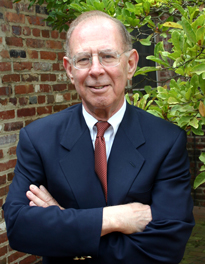 Harlow Unger
Harlow Unger
Harlow Unger is the author of twenty-three books, most on individuals and themes from this same period in American history. There is a considerable body of research behind the book. That said, I found it hard to read – the prose oscillates from inscrutable to leaden to transparent, with too much of the first and not enough of the last. The emphasis is on Webster the patriot, as in the subtitle, and not on his personality or his dictionary. There is little of the inner man to be found in these pages. Nor is there much about how he went about the process that created that lasting testament, the dictionary. Those years occupy a small part of the book. Of course, no book can do everything, and I learned a lot from it. My thanks to the author.
